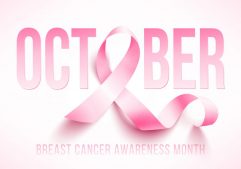Submitted by
Kassi Roselius, M.D., M.P.H.
One in eight women in the United States will be diagnosed with breast cancer in her lifetime. Breast cancer is the most commonly diagnosed cancer in women. October is Breast Cancer Awareness Month, and the Citizen Potawatomi Nation Health Services Public Health Department would like to offer education about diagnosis and possible prevention.
 Risk Factors
Risk Factors
A risk factor is something that increases the chances of a woman developing breast cancer. There are genetic and environmental (lifestyle) risk factors. Genetic factors include gender — breast cancer occurs nearly 100 times more often in women than in men. Age is another risk factor with invasive cancer most often being diagnosed after the age of 55. A family history of a relative being diagnosed with breast or ovarian cancer, before the age of 50, also increases a person’s risk. Dense breast tissue (often seen on screening mammograms) can make certain abnormalities more difficult to detect. Also, genetic mutations in the BRCA1 and BRCA2 genes can increase the risk of developing breast cancer.
Avoidable lifestyle risk factors include being sedentary, which can be circumvented by increasing physical activity. Women should strive to achieve a healthy body mass index between 18 and 24 to avoid being overweight or obese. A poor diet, such as one high in saturated fat and lacking fruits and vegetables can increase the risk for breast cancer. Frequent consumption of alcohol can increase the risk as well. Combined hormone replacement therapy, which is used to treat menopausal symptoms, can increase the risk for breast cancer and the risk that the cancer will be detected at a more advanced stage.
Screening
Early detection and screening is important in the diagnosis and management of breast cancer. The American College of Radiology recommends routine, yearly screenings with mammography beginning at age of 40. A mammogram is an X-ray of the breast that looks for changes, which may be signs of breast cancer. Expert recommendations vary on the age to start screening and how often to have a routine mammogram. The United States Preventive Services Task Force recommends a discussion with women at the age of 40, which includes shared decision-making based on risks, benefits, patient values and preferences to make an individualized plan. After 50 years old, the USPSTF recommendations suggest women have a screening mammogram every two years. The American Academy of Family Physicians follows in line with the USPSTF recommendations stated above.
Further imaging may be required to follow up on any changes in breast tissue seen on the initial screening mammogram. Additional imaging modalities include breast ultrasound, breast MRI and possible breast biopsy.
Breast self-examination is no longer a recommendation among experts and is generally not taught to patients at clinic visits. Women who have well-woman examinations usually will have a routine clinical breast examination performed by their provider.
Treatment
Women with a new diagnosis of breast cancer can be stratified by the extent of their disease. Patients with early-stage breast cancer may have the option to surgically remove the tumor depending on the size. There is a breast-conserving surgery with radiation therapy or mastectomy (removal of breast tissue) with or without radiation. Tumor characteristics themselves, such as being hormone receptor positive, are used to select additional treatments with chemotherapy and/or endocrine therapy.
Locally advanced breast cancer usually is treated with chemotherapy to potentially improve the rate of breast conservation without compromising survival outcomes rather than proceeding with primary surgery.
Please contact your local clinic with Citizen Potawatomi Nation Health Services to schedule an appointment with your physician or nurse practitioner in order to discuss breast cancer screening. Mammography is provided at CPNHS in the imaging department.
CPN Health Services West Clinic:
405-964-5770
CPN Health Services East Clinic:
405-878-4693
